What Tea Gives You Energy
When considering teas for energy, green tea is a standout option. It contains caffeine, a natural stimulant, and L-theanine, which works in synergy with caffeine to enhance alertness while promoting a calm state of mind.
Black tea offers a higher caffeine content, making it a robust choice for your morning routine. Its rich flavor profiles range from malty to sweet, with the added benefit of containing antioxidants.
White tea is the least processed tea, preserving high levels of caffeine and catechins. Expect a lighter taste but a revitalizing effect similar to green or black teas.
Bestsellers
Yerba mate is a South American herbal tea known for its invigorating qualities. It contains a unique mix of caffeine, theobromine, and theophylline, offering a balanced energy boost without the harshness of coffee.
Oolong tea sits between green and black teas in terms of oxidation. It provides a moderate amount of caffeine and can be ideal for those seeking a middle ground.
Here's a quick comparison:
| Tea Type | Caffeine Level | Flavor Characteristics |
|---|---|---|
| Green Tea | Moderate | Grassy, fresh |
| Black Tea | High | Malty, robust |
| White Tea | Moderate | Delicate, slightly sweet |
| Yerba Mate | High | Earthy, bold |
| Oolong Tea | Moderate | Floral, smooth, can vary in intensity |
Remember that individual reactions to caffeine vary, and you should monitor your own experience with these teas to find the best fit for your needs.
Types of Energizing Tea
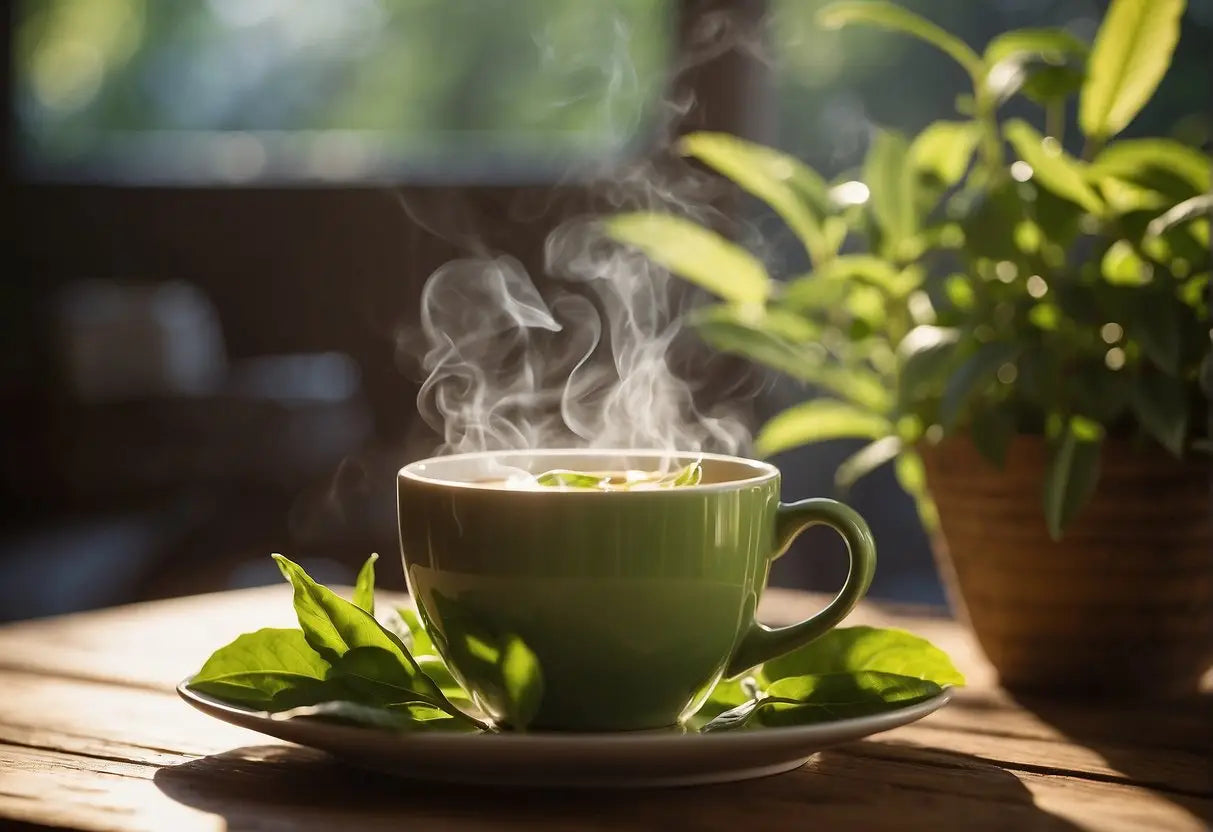
Teas can be a natural way to boost your energy levels. Each type varies in caffeine content and other energizing compounds.
Black Tea
You'll find that black tea is among the most caffeinated teas, with about 47 mg of caffeine per 8 oz serving. Due to its high caffeine content, it can provide a substantial energy boost.
Green Tea
Green tea contains a moderate amount of caffeine, averaging around 28 mg per 8 oz cup. It also has L-theanine, which can promote a more stable and sustained energy release without the jitters.
Oolong Tea
Oolong tea offers a caffeine content that falls between black and green tea, typically around 38 mg per 8 oz cup. This semi-fermented tea can provide a smoother, longer-lasting increase in energy.
Yerba Mate
Yerba Mate stands out with its unique compound mix, offering about 85 mg of caffeine per 8 oz serving. It is also rich in antioxidants and can elevate mental and physical energy levels.
Guarana Tea
Guarana Tea is less common but potent, with approximately 47 mg of caffeine per 8 oz. It includes other stimulants like theobromine and theophylline, which may enhance its energizing effects.
Caffeine Content in Tea

Lao Ban Zhang
In this section, you will find specific details about the caffeine content in tea and its comparison to coffee, as well as the influence of caffeine on energy levels.
Comparison with Coffee
The Caffeine content in tea can vary widely but is generally lower than that of coffee. On average:
- Brewed Coffee: 95-200 mg of caffeine per 8 oz cup
- Brewed Tea: 15-70 mg of caffeine per 8 oz cup
Below is a more detailed comparison:
| Beverage | Average Caffeine Content per 8 oz |
|---|---|
| Brewed Coffee | 95-200 mg |
| Black Tea | 40-70 mg |
| Green Tea | 20-45 mg |
| White Tea | 15-30 mg |
| Herbal Tea | 0 mg (Herbal teas are generally caffeine-free) |
Effects of Caffeine on Energy Levels
Caffeine acts as a stimulant on your central nervous system, leading to increased alertness and energy. The timeline of effects typically appears as follows:
- Peak Levels: Achieved within 30 to 60 minutes of consumption
- Half-life: 3 to 5 hours; the time it takes for the caffeine level in your blood to reduce by half
Caffeine can help improve your focus and concentration, making you feel more energized, especially in lower doses. However, sensitivity to caffeine varies, and high doses may cause jitteriness or interfere with sleep.
Natural Ingredients that Boost Energy
Certain natural ingredients can enhance your energy levels significantly. They are well-researched and come with a history of traditional use.
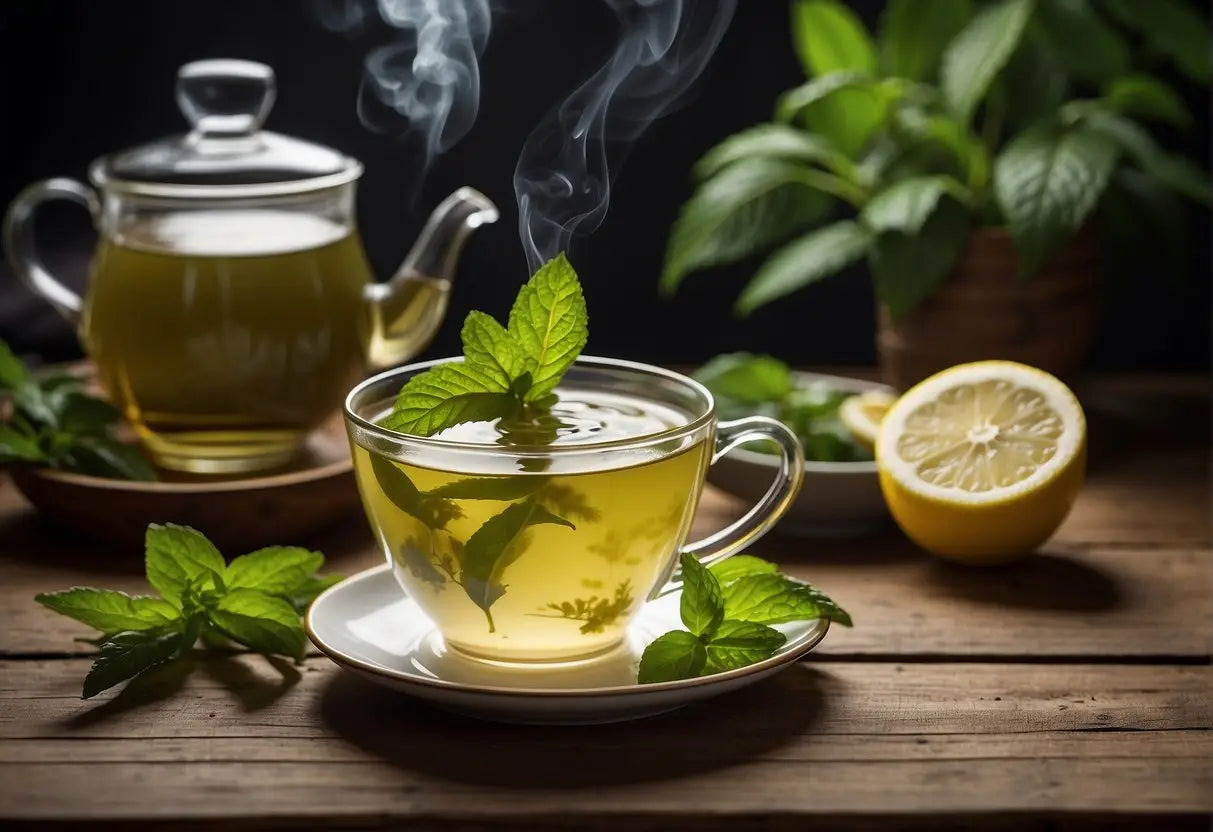
Ginseng
Ginseng, particularly Panax ginseng, is renowned for its potential to fight fatigue and boost energy. Studies have shown that ginseng may help improve physical performance and mental alertness. You might find it in various forms, such as teas, capsules, or extracts.
- Form: Tea, capsules, extracts
- Benefits: Fights fatigue, improves physical performance, enhances mental alertness
Eleuthero
Also known as Siberian ginseng (Eleutherococcus senticosus), Eleuthero is not a true ginseng but has similar energy-boosting properties. It's considered an adaptogen, helping your body to counteract stress and bolster energy levels.
- Form: Tea, capsules, liquid extracts
- Benefits: Reduces stress, increases endurance
Ginkgo Biloba
Ginkgo Biloba is often associated with improved cognitive function, but it is also believed to contribute to increased physical energy and improved circulatory health. The active components like flavonoids and terpenoids support blood flow, which is essential for energy.
- Form: Teas, tablets, capsules
- Benefits: Enhances cognitive function, supports circulatory health
Health Benefits of Energy-Boosting Teas
Energy-boosting teas can enhance your physical performance, improve mental alertness, and give your metabolism a slight boost. These benefits are owed to their natural compounds.
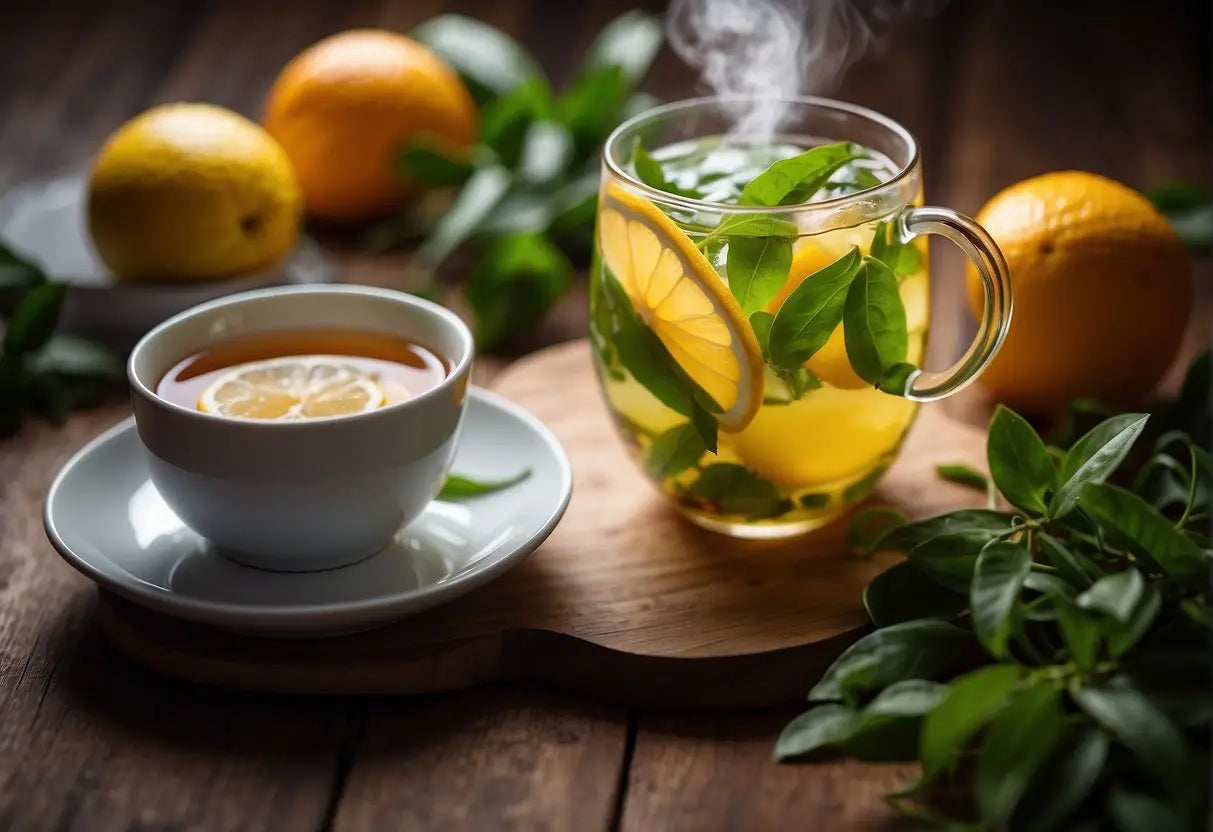
Physical Performance
Caffeine is a key component in many teas, known for its ability to heighten physical endurance. For instance, green tea contains a modest amount of caffeine that can help sustain energy levels during exercise. Additionally, certain teas have L-theanine, an amino acid that can promote smoother energy release.
Mental Alertness
Teas like black tea and oolong tea are praised for their ability to enhance mental focus. They contain both caffeine and L-theanine, which together improve brain function. In fact, these components have been shown to increase alertness while also fostering a sense of calm.
Metabolic Boost
Some teas can elevate metabolic rate for short periods. Green tea and oolong tea are particularly noted for their metabolism-boosting properties. These teas contain polyphenols and catechins, which can slightly and temporarily increase calorie burn.
Note: It's essential to consume these teas as part of a balanced diet and healthy lifestyle for optimal results.
Brewing Methods for Optimal Energy
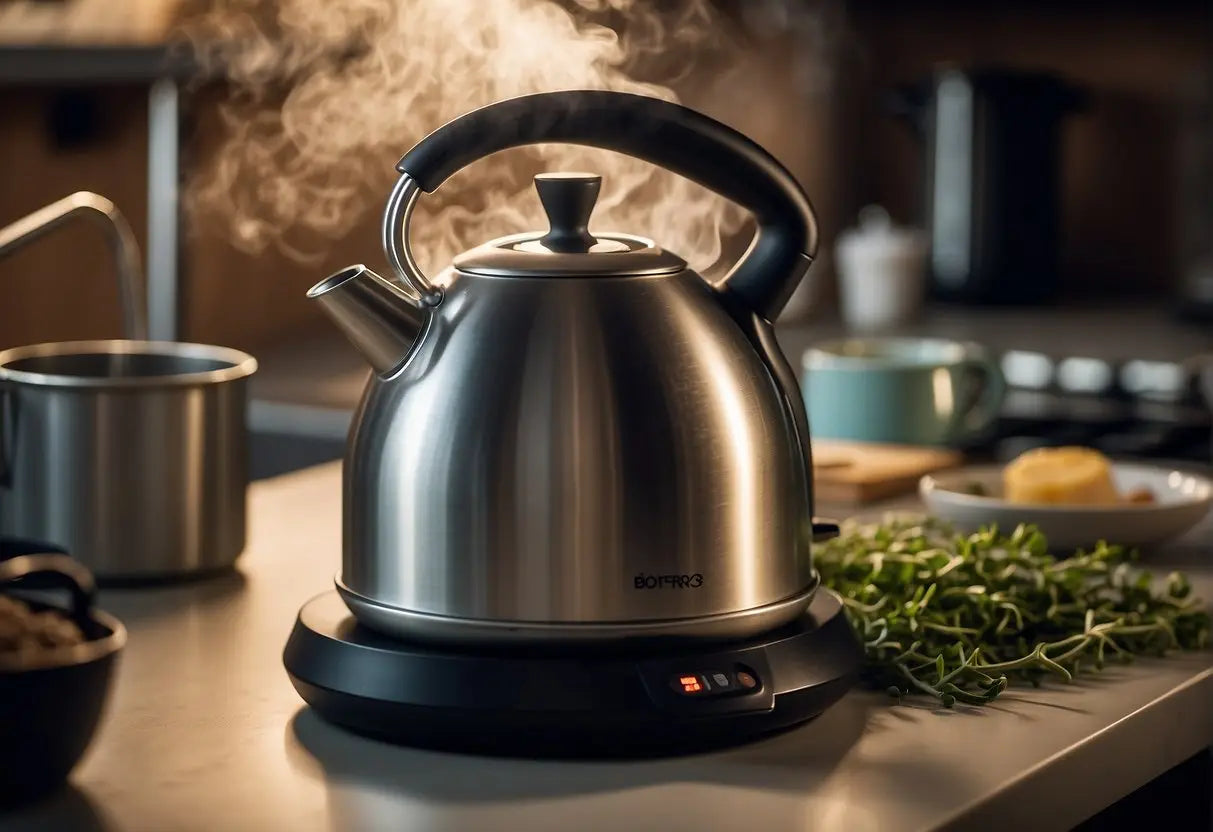
The extraction of caffeine and antioxidants effectively depends on steeping times and water temperatures.
Steeping Times
To maximize energy from your tea, steeping time is crucial. For black tea, a 3-5 minute steep is optimal. Green tea requires only 2-3 minutes. Oversteeping can cause bitterness and a decrease in energizing effects.
- Black Tea: 3-5 minutes
- Green Tea: 2-3 minutes
- White Tea: 4-5 minutes
- Oolong Tea: 3-5 minutes
- Note: These times provide a balance between flavor and caffeine content.
Water Temperature
The temperature of the water used to brew tea is equally important for energy extraction.
- Black/Oolong Tea: near-boiling water (~212°F or 100°C)
- Green/White Tea: cooler water (~160-185°F or 71-85°C)
Boiling water can destroy catechins in green and white teas, while cooler water may not extract the full potential of black and oolong teas.
- Do use a thermometer for accuracy.
- Do Not overheat water for delicate teas.
Potential Side Effects and Precautions
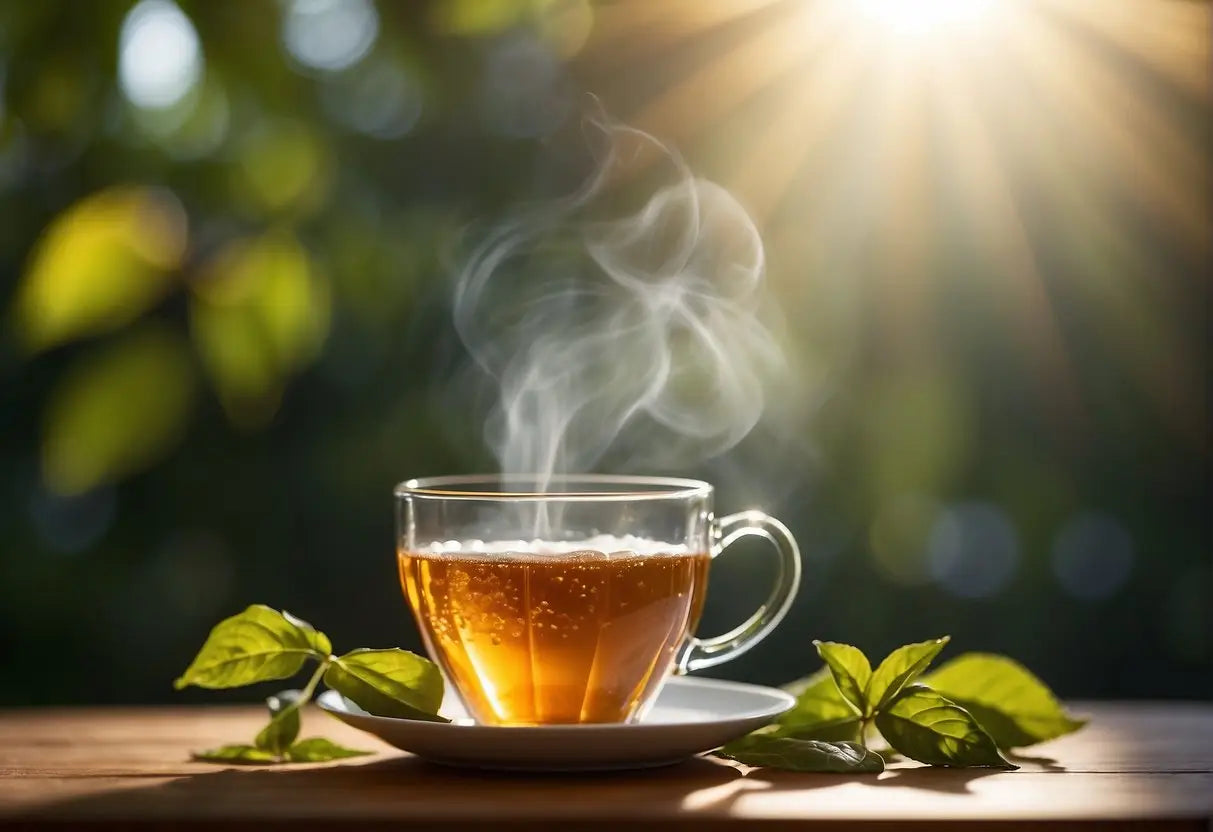
When consuming tea for energy, be mindful of the following potential side effects:
Caffeine Sensitivity: If you’re sensitive to caffeine, you may experience:
- Nervousness
- Restlessness
- Insomnia
- Palpitations
Consumption Limits: To minimize risks, it's generally recommended not to exceed 400mg of caffeine daily, which equates to about 4 cups of brewed coffee.
Iron Absorption: Tea contains tannins that can inhibit the absorption of iron from food. If you have iron-deficiency concerns, consider consuming tea between meals.
Pregnancy and Breastfeeding: Caffeine intake should be limited if you're pregnant or breastfeeding. The recommended maximum is about 200mg per day, the equivalent to 2 cups of coffee.
Interactions with Medications: Tea can interact with certain medications, including:
- Stimulants
- Blood thinners
- Blood pressure medications
- Certain antibiotics
Pre-existing Medical Conditions: If you have heart problems or anxiety issues, consult your doctor before increasing your tea intake for energy.
Note: This information does not constitute medical advice. Always consult with a healthcare provider for personalized guidance.
Frequently Asked Questions
Tea can be a great beverage for boosting your energy. Different varieties offer unique benefits, from increasing your alertness to supporting your weight loss efforts.
Which herbal teas are most effective for combating fatigue?
Herbal teas like ginseng and yerba mate are known for their energizing effects. Ginseng can help fight off fatigue, while yerba mate is praised for its stimulating properties.
What are the best teas to enhance energy and improve focus?
Black tea and oolong tea are excellent for enhancing energy and focus. Their caffeine content and L-theanine work together to improve alertness without leading to jitters.
Can you recommend a green tea that boosts energy levels significantly?
Matcha green tea is a fine powder made from whole tea leaves and is known for significantly boosting energy. The combination of caffeine and L-theanine offers a sustained energy lift.
Are there teas that can increase energy while also supporting weight loss?
Green tea, especially matcha, can increase metabolism and help with weight loss while providing an energy boost. Oolong tea is also effective for weight management and energy.
Is it possible to find an energizing tea that contains no caffeine?
Rooibos tea is a caffeine-free alternative that may offer a mild boost in energy due to its nutrient content, though it's less potent compared to caffeinated teas.
How does the energy boost from tea compare to that of coffee?
Tea provides a more moderated and sustained energy boost compared to coffee, largely because of the amino acid L-theanine, which helps to moderate caffeine's effects.
← Older post Newer post →











